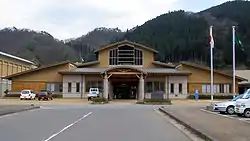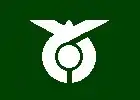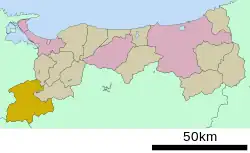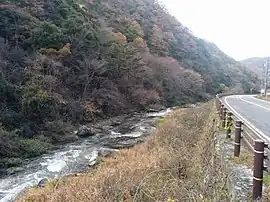Nichinan
日南町 | |
|---|---|
 Nichinan town hall | |
 Flag  Emblem | |
Location of Nichinan in Tottori Prefecture | |
 | |
 Nichinan | |
| Coordinates: 35°10′N 133°18′E / 35.167°N 133.300°E | |
| Country | Japan |
| Region | Chūgoku San'in |
| Prefecture | Tottori |
| District | Hino |
| Area | |
| • Total | 340.96 km2 (131.65 sq mi) |
| Population (December 31, 2022) | |
| • Total | 4,144 |
| • Density | 12/km2 (31/sq mi) |
| Time zone | UTC+9 (Japan Standard Time) |
| Phone number | 0859-82-1111 |
| Address | 800 Kasumi, Nichinan, Hino-gun, Tottori-ken 689-5292 |
| Climate | Cfa |
| Website | Official website |

Nichinan (日南町, Nichinan-chō) is a town located in Hino District, Tottori Prefecture, Japan. As of 31 December 2021, the town had an estimated population of 4,144 in 1903 households and a population density of 12 persons per km2.[1] The total area of the town is 340.962 square kilometres (131.646 sq mi), representing 10% of the total area of Tottori Prefecture.Over 90% of the town is covered by mountains and forest,[2] and 5% of the land is arable.[3] Areas of Nichinan are part of Hiba-Dogo-Taishaku Quasi-National Park.
Geography
Nichinan is a landlocked town located at the south-western tip of Hino District in the southwestern corner of Tottori Prefecture. The town is mountainous and located on the backbone of the Chūgoku Mountains.
Mountains
- Mount Dōgo (道後山, Dōgōyama)–1,271 m (4,170 ft)
- Mount Hanami (花見山, Hanamiyama)–1,188 m (3,898 ft)
- Mount Inazumi (稲積山, Inazumiyama)–1,143.3 m (3,751 ft)
- Mount Sentsū (船通山, Sentsūzan)–1,142 m (3,747 ft)
- Mount Ōkura (大倉山, Ōkurasan)–1,112 m (3,648 ft)
- Mount Kirin (鬼林山, Kirinzan)–1,031 m (3,383 ft)
- Mount Mikuni (三国山, Mikunisan)–1,004.1 m (3,294 ft)
- Mount Ohaka (御墓山, Ohakayama)–758 m (2,487 ft)[4][3]
Lakes
- Lake Nichinan (日南湖, Nichinanko)[5]
Dams
- Sugesawa Dam (菅沢ダム, Sugesawa Damu)[6]
Rivers
The Hino River originates in Nichinan. Four of its major tributaries in Nichinan include:
- Inga River (印賀川, Inga-gawa)
- Iwami River (石見川, Iwami-gawa)
- Kobara River (小原川, Kobara-gawa)
- Kutsuka River (九塚川, Kutsuka-gawa)[3]
Neighboring municipalities
Hiroshima Prefecture
Tottori Prefecture
Okayama Prefecture
Shimane Prefecture
Climate
Nichinan has a Humid climate (Köppen Cfa) characterized by warm, wet summers and cold winters with heavy snowfall. The average annual temperature in Nichinan is 11.3 °C (52.3 °F). The average annual rainfall is 1,894.1 mm (74.57 in) with July as the wettest month. The temperatures are highest on average in August, at around 23.4 °C (74.1 °F), and lowest in January, at around −0.2 °C (31.6 °F).[7] Its record high is 34.9 °C (94.8 °F), reached on 19 August 2020, and its record low is −17.7 °C (0.1 °F), reached on 16 February 2011.[8]
| Climate data for Nichinan (1991−2020 normals, extremes 1978−present) | |||||||||||||
|---|---|---|---|---|---|---|---|---|---|---|---|---|---|
| Month | Jan | Feb | Mar | Apr | May | Jun | Jul | Aug | Sep | Oct | Nov | Dec | Year |
| Record high °C (°F) | 15.3 (59.5) |
19.1 (66.4) |
22.5 (72.5) |
29.7 (85.5) |
31.7 (89.1) |
31.6 (88.9) |
33.9 (93.0) |
34.9 (94.8) |
32.9 (91.2) |
28.8 (83.8) |
24.1 (75.4) |
18.2 (64.8) |
34.9 (94.8) |
| Mean daily maximum °C (°F) | 3.9 (39.0) |
5.1 (41.2) |
9.7 (49.5) |
16.4 (61.5) |
21.4 (70.5) |
24.3 (75.7) |
27.8 (82.0) |
28.8 (83.8) |
24.3 (75.7) |
18.9 (66.0) |
13.2 (55.8) |
6.9 (44.4) |
16.7 (62.1) |
| Daily mean °C (°F) | −0.2 (31.6) |
0.3 (32.5) |
3.9 (39.0) |
9.6 (49.3) |
15.0 (59.0) |
18.9 (66.0) |
22.9 (73.2) |
23.4 (74.1) |
19.0 (66.2) |
12.9 (55.2) |
7.3 (45.1) |
2.2 (36.0) |
11.3 (52.3) |
| Mean daily minimum °C (°F) | −4.5 (23.9) |
−4.7 (23.5) |
−1.8 (28.8) |
2.7 (36.9) |
8.6 (47.5) |
14.0 (57.2) |
18.8 (65.8) |
19.1 (66.4) |
14.6 (58.3) |
7.3 (45.1) |
1.9 (35.4) |
−2.1 (28.2) |
6.2 (43.1) |
| Record low °C (°F) | −17.4 (0.7) |
−17.7 (0.1) |
−14.0 (6.8) |
−6.9 (19.6) |
−2.5 (27.5) |
3.2 (37.8) |
6.3 (43.3) |
10.3 (50.5) |
1.0 (33.8) |
−3.2 (26.2) |
−9.2 (15.4) |
−14.5 (5.9) |
−17.7 (0.1) |
| Average precipitation mm (inches) | 137.1 (5.40) |
114.2 (4.50) |
138.2 (5.44) |
121.4 (4.78) |
131.9 (5.19) |
194.1 (7.64) |
253.9 (10.00) |
162.7 (6.41) |
234.4 (9.23) |
147.2 (5.80) |
110.8 (4.36) |
150.7 (5.93) |
1,894.1 (74.57) |
| Average precipitation days (≥ 1.0 mm) | 19.2 | 15.6 | 15.4 | 11.6 | 11.0 | 12.5 | 14.1 | 12.0 | 12.5 | 10.8 | 13.3 | 18.6 | 166.6 |
| Mean monthly sunshine hours | 57.7 | 72.2 | 129.8 | 178.0 | 195.1 | 139.4 | 139.4 | 172.1 | 120.0 | 133.0 | 104.0 | 67.3 | 1,508.5 |
| Source: Japan Meteorological Agency[8][7] | |||||||||||||
Demography
Per Japanese census data,[9] the population of Nichinan has been as follows. The town has been suffering from rural depopulation, and the population has been rapidly decreasing since the 1960s.
| Year | Pop. | ±% |
|---|---|---|
| 1920 | 13,080 | — |
| 1930 | 13,779 | +5.3% |
| 1940 | 13,829 | +0.4% |
| 1950 | 16,045 | +16.0% |
| 1960 | 15,286 | −4.7% |
| 1970 | 11,051 | −27.7% |
| 1980 | 8,889 | −19.6% |
| 1990 | 7,974 | −10.3% |
| 2000 | 6,696 | −16.0% |
| 2010 | 5,458 | −18.5% |
History
The area of Nichinan was part of ancient Hōki Province. During the Edo Period, it was part of the holdings of the Ikeda clan of Tottori Domain. Following the Meiji restoration. the area was divided into villages within Hino District, Tottori on October 1, 1889, with the establishment of the modern municipalities system. The town of Hokunan (伯南町) was created by the merger of the villages of Hinoue and Yamagami on May 2, 1955. It merged with the villages of Takamiya, Tari, Iwami and Fukue to form the town of Nichinan on April 1, 1959.
Government
Nichinan has a mayor-council form of government with a directly elected mayor and a unicameral town council of ten members. Nichinan, collectively with the other municipalities of Hino District, contributes one member to the Tottori Prefectural Assembly. In terms of national politics, the town is part of Tottori 2nd district of the lower house of the Diet of Japan.
Economy
The economy of Nichinan is based agriculture, forestry, and seasonal tourism to its ski resorts.
Education
Nichinan has one public elementary school and one public junior high school operated by the town government. The town does not have a high school.
Transportation
Railway
Highways
Local attractions
Cultural Institutions
The Nichinan Cultural Center (785 Kasumi, Nichinan, Tottori), located next to the Nichinan Town Hall, houses the town's three main cultural facilities in one building.[16] The Cultural Center is accessible by bus, or a 30-minute walk, from the JR West Hakubi Line Shōyama Station.
References
- ↑ "Nichinan town official statistics" (in Japanese). Japan.
- ↑ にちなんの森(in Japanese)
- 1 2 3 "Inga-gawa". Nihon Rekishi Chimei Taikei (日本歴史地名大系 "Compendium of Japanese Historical Place Names") (in Japanese). Tokyo: Netto Adobansusha. 2012. Archived from the original on 2007-08-25. Retrieved 2012-02-14.
- ↑ 鳥取県の山岳信仰の山一覧(in Japanese)
- ↑ 日南湖(にちなんこ)(in Japanese)
- ↑ 菅沢ダム OfficialWeb(in Japanese)
- 1 2 気象庁 / 平年値(年・月ごとの値). JMA. Retrieved March 24, 2022.
- 1 2 観測史上1~10位の値(年間を通じての値). JMA. Retrieved March 24, 2022.
- ↑ Nichinan population statistics
- ↑ "Sekka-kei". Nihon Daihyakka Zensho (Nipponika) (日本大百科全書(ニッポニカ) "Large Encyclopedia of Japan (Nipponika)") (in Japanese). Tokyo: Netto Adobansusha. 2012. Archived from the original on 2007-08-25. Retrieved 2012-02-14.
- ↑ ふるさと日南邑(in Japanese)
- ↑ 日南りんご村(in Japanese)
- ↑ 花見山スキー場(in Japanese)
- ↑ 楽楽福神社社叢(in Japanese)
- ↑ "Gedatsu-ji". Nihon Rekishi Chimei Taikei (日本歴史地名大系 "Compendium of Japanese Historical Place Names") (in Japanese). Tokyo: Netto Adobansusha. 2012. Archived from the original on 2007-08-25. Retrieved 2012-01-12.
- ↑ 日南町総合文化センター(in Japanese)
- ↑ さつきホール Archived 2011-07-22 at the Wayback Machine(in Japanese)
- ↑ 日南町図書館(in Japanese)
- ↑ 日南町美術館(in Japanese)
External links
 Media related to Nichinan, Tottori at Wikimedia Commons
Media related to Nichinan, Tottori at Wikimedia Commons- Nichinan official website (in Japanese)